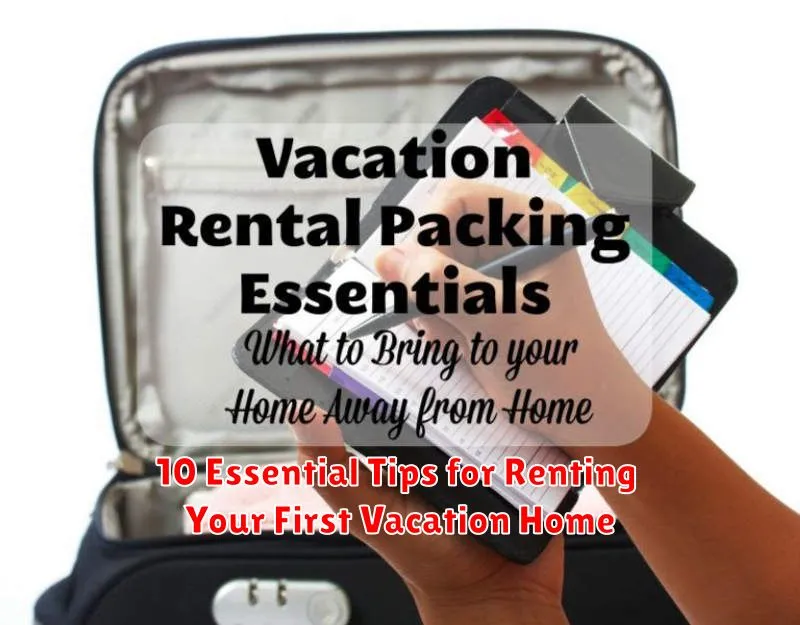Planning your first vacation home rental can be an exciting but sometimes overwhelming experience. From choosing the perfect vacation rental destination to understanding the nuances of rental agreements, there are numerous factors to consider. This guide, “10 Essential Tips for Renting Your First Vacation Home,” offers invaluable advice for first-time vacation home renters, providing the essential knowledge needed to secure a dream vacation rental property and ensure a smooth and memorable experience.
Navigating the vacation rental market can feel daunting, especially for first-timers. This guide will cover essential tips for finding the ideal vacation rental home within your budget, understanding rental fees and policies, and ensuring a comfortable and enjoyable stay. With these 10 essential tips, you’ll be well-equipped to find the perfect vacation home rental and embark on a truly unforgettable getaway.
Start Your Search Early
Don’t wait until the last minute to begin your search for a vacation rental. Demand, especially during peak season, can significantly limit your choices and drive up prices. Starting early provides a wider selection and increases your chances of securing the ideal property.
Begin your search several weeks or even months in advance, particularly if your travel dates fall within a popular vacation period. This proactive approach allows ample time to research different properties, compare prices, and read reviews.
Consider Off-Peak Seasons

Vacation rentals often come with lower price tags during the off-peak season. These periods, typically falling outside of major holidays and school breaks, can offer significant savings.
While you might experience slightly less desirable weather or have fewer local events to choose from, the reduced crowds and peaceful atmosphere can be a worthwhile trade-off.
Research the specific area you’re interested in to understand its off-peak season and weigh the pros and cons against peak season pricing and availability.
Read Reviews Carefully
Before booking, thoroughly examine reviews from previous renters. Pay close attention to recurring themes and both positive and negative comments. Look for mentions of cleanliness, accuracy of the listing description, communication with the host, and overall experience.
Don’t just rely on the overall star rating. Dive into the specific feedback to gain a more comprehensive understanding of the property and the rental experience. This will help you set realistic expectations and avoid potential disappointments.
Clarify the Terms of Stay
Before finalizing your booking, thoroughly review the terms of stay. This includes understanding the check-in and check-out times, guest capacity limits, and any restrictions on pets, smoking, or parties.
Pay close attention to cancellation policies and potential fees for damages. Clearly understanding these terms upfront can prevent misunderstandings and unexpected costs later on. Don’t hesitate to ask the owner or property manager for clarification on any points that are unclear.
Ensure the Property Is Well-Equipped
A well-equipped vacation rental can significantly enhance your experience. Before booking, confirm the property has essential amenities. This includes a fully functional kitchen with appliances like a refrigerator, stove, oven, and microwave. Laundry facilities, such as a washer and dryer, are also highly desirable, especially for longer stays.
Consider your entertainment needs. Does the property offer Wi-Fi and a television? If you plan on working remotely, reliable internet access is crucial. For families with children, inquire about child-proofing measures if necessary.
Finally, don’t forget the basics. Ensure the property provides linens, towels, and essential toiletries. Confirming these details upfront will prevent any unwelcome surprises upon arrival and contribute to a more relaxing vacation.
Understand Cancellation Policies
Before booking, carefully review the vacation rental’s cancellation policy. Policies vary significantly. Some offer full refunds if you cancel within a specific timeframe, while others may only offer partial refunds or no refunds at all.
Look for policies that offer flexibility, especially if you are traveling during uncertain times. Consider travel insurance that covers trip cancellations for unforeseen circumstances.
Understanding the cancellation policy upfront can prevent unpleasant surprises and financial losses should your travel plans change.
Check Accessibility and Location
Accessibility and location are paramount when selecting a vacation rental. Consider your transportation needs. Will you be driving, flying, or using public transport? How close is the rental to the airport or train station? If driving, is parking readily available?
Think about the accessibility of the property itself. Are there stairs? Is it suitable for guests with mobility issues? If you have specific needs, inquire with the owner or property manager to ensure the rental meets your requirements.
Regarding location, consider your vacation goals. Do you prioritize beach proximity, being in the heart of a bustling city, or the tranquility of a secluded mountain cabin? Research the neighborhood. Is it safe? Are there restaurants, shops, and attractions nearby? Understanding these aspects will ensure a smoother and more enjoyable vacation experience.
Look Into Security and Insurance
Security is a vital aspect of renting a vacation home. Ensure the property has robust measures in place, such as deadbolt locks, exterior lighting, and potentially a security system. Inquire with the owner about existing security features and consider supplementing them if necessary. A safe for securing valuables is also a good idea.
Insurance is equally important. Verify that the homeowner’s insurance policy covers rentals. You should also consider obtaining renter’s insurance to protect your personal belongings during your stay. Discuss coverage details with both the homeowner and your insurance provider to ensure adequate protection in case of theft, damage, or liability.
Confirm Contact Information
Before finalizing your booking, meticulously verify all contact information. This includes your phone number, email address, and emergency contact details.
Accurate contact information is crucial for the property owner or manager to reach you with important updates, check-in instructions, or in case of emergencies during your stay. Providing incorrect information could lead to missed communications and potential issues.
Similarly, confirm the property manager or owner’s contact information. Ensure you have a reliable way to reach them should any questions or concerns arise before, during, or after your stay.
Document Property Conditions on Arrival
Upon arrival at your vacation rental, it’s crucial to thoroughly document the property’s condition. This protects you from potential disputes regarding pre-existing damage.
Carefully inspect the property for any damage, cleanliness issues, or discrepancies from the listing description. Take photos and videos as comprehensive visual evidence. Note any issues immediately to the property manager or owner. This proactive approach establishes a clear record of the property’s state at check-in and can help prevent misunderstandings later on.
This documentation can be invaluable if a dispute arises over security deposits or damage claims. By having a clear record, you can protect yourself from unfair charges.

